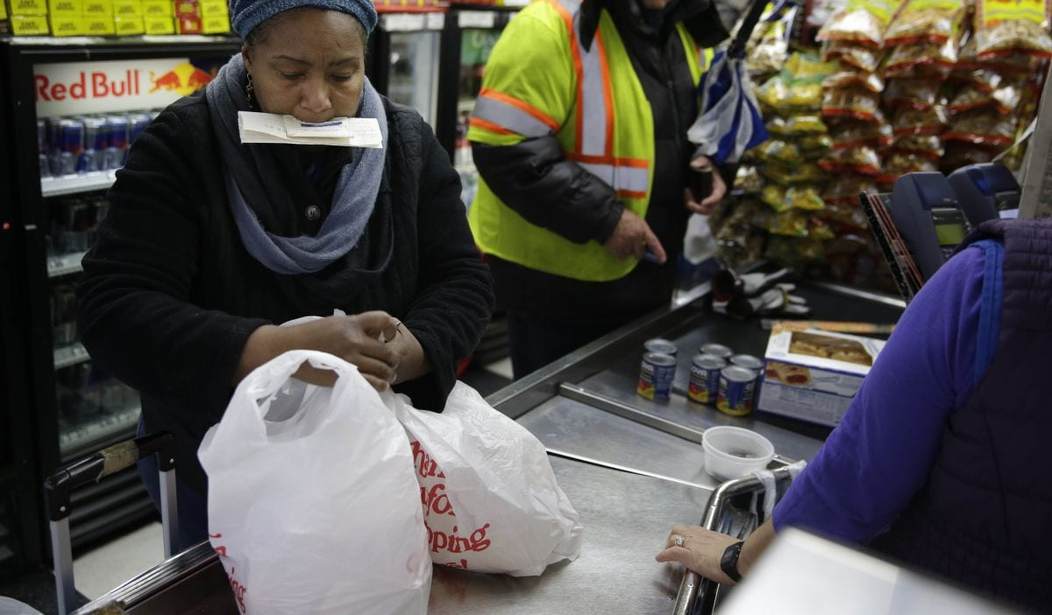Citing a strong economy and low unemployment, the Trump administration is proposing a tweak to eligibility rules for the Supplemental Nutrition Assistance Program (SNAP). The changes will cut 3.1 million people from the food stamp program.
The administration billed the move as a way to save money and help eliminate what it sees as widespread abuse of the program, but Democrats and advocacy groups criticized it as an attack on the nation’s poorest.
“This rule would take food away from families, prevent children from getting school meals, and make it harder for states to administer food assistance,” said Democratic Senator Debbie Stabenow, ranking member of the Senate Committee on Agriculture, Nutrition and Forestry.
In the immortal words of Defense Secretary Albert Nimziki from Independence Day, “Excuse me, but that’s not entirely accurate.” In fact, it’s an outright lie.
What is being proposed is that those who receive benefits from the Temporary Assistance for Needy Families (TANF) program have their income eligibility checked to see if they also qualify for food stamps.
Currently, 43 U.S. states allow residents to automatically become eligible for food stamps through the Supplemental Nutrition Assistance Program, or SNAP, if they receive benefits from another federal program known as Temporary Assistance for Needy Families, or TANF, according to the USDA.
The agency wants to change that by requiring people who receive TANF benefits to pass a review of their income and assets to determine whether they are also eligible for free food from SNAP, officials said.
In other words, instead of an automatic, ask-no-questions pass through for TANF beneficiaries, there will be an eligibility check. USDA estimates that checking to see if people are making too much money to qualify for food stamps will save more than $15 billion annually.
That ain’t pocket change — even for government money. But it gives Democrats a perfect opportunity to posture, weep, gnash their teeth, and emote all over the place, criticizing the heartless Trump for snatching food from the mouths of babes.
Or, something.
Current rules allow people to access SNAP benefits worth thousands of dollars for two years without going through robust eligibility reviews, [USDA Acting Deputy Undersecretary Brandon Lipps] told reporters on the call.
“Unfortunately, automatic eligibility has expanded to allow even millionaires and others who simply receive a TANF-funded brochure to become eligible for SNAP when they clearly don’t need it,” Lipps said.
The liberal-leaning Center For American Progress advocacy group said the proposal would hurt the poor “by forcing states to take food assistance away from those with even modest savings of a few thousand dollars,” and raise administrative costs for states.
Earth to CAP: If “poor people” possess “modest savings of a few thousand dollars,” they wouldn’t be poor. That’s a laughable statement and shows how much of a stretch defending this rule has become.
I know how important food stamps are to many families. I also know the focus of the program is in the wrong direction. Instead of just giving money to people to buy food, why not teach people what to eat and how to shop for food?
Most of us know the value of food budgeting. Many of us also know how to eat healthy. If the USDA would place the emphasis on actually teaching poor people how to spend their food dollars wisely, the savings would be enormous. Currently, the USDA has several education programs to do just that. But what if they were mandatory? Would Democrats really oppose a program that allowed people to become more self-sufficient?
“Give a man a fish, and you feed him for a day. Teach a man to fish, and you feed him for a lifetime.” Food shopping is one of those “life skills” that, through no fault of their own, poor people lack. If we can teach the poor how to shop and what to shop for, it would save the taxpayer billions and give the poor a sense of responsibility and self-sufficiency.










Join the conversation as a VIP Member